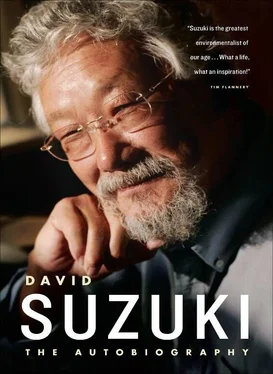Tara had never taken out Canadian citizenship, but before we set off, she needed a passport, and she wanted to travel as a Canadian. She and brother, Pieter, went to the passport office to each apply for a passport, expecting no problem, because they had lived here since they were children. Sure enough, Piet's application was readily accepted.
Tara then stepped up, and the clerk saw she had the same last name as Piet. “Oh, you're his wife?” he asked. “No,” Tara replied, “he's my brother.” The clerk was confused: “But you say on the forms that you are married.” “Yes, I'm keeping my maiden name,” Tara told him. The clerk told her that was illegal, and her application for a passport was rejected.
That was a shocker, and she returned home furious. She needed a passport if she were to travel with me, and she intended to travel on a Canadian passport. She found that so long as a woman never used a married name, she could continue to go legally by her maiden name. We were outraged at the rejection of her passport application, so I called The Vancouver Sun and told someone in the newsroom about the situation. I thought it would make a good story, and I was stunned after the journalist listened to my spiel and responded, “So what's the news? Besides, I happen to have a wife who loves to use my name.” Click; that was it. Ironically, only a few weeks later, The Vancouver Sun ran a front-page story about an American woman who was denied an American passport because she refused to use her husband's name. If it's in the United States, that's a good Canadian story.
Eventually, Tara found someone in the federal External Affairs Department in Ottawa who didn't reject her application out of hand. This was a precedent-setting request, he informed her, and she could go to Ottawa to make her application in person. “You will get your passport,” he promised her, “but I can't guarantee it will be made out in your maiden name.” She was given a date to make her case and flew to Ottawa, full of trepidation because we didn't know what the outcome would be.
In the end, she was granted a passport in her maiden name, a precedent that few are aware of and most today simply take for granted. Our daughters have assumed both of our names, as Cullis-Suzuki, but what happens when more and more children take on double-barreled names and begin to meet and marry? In any case, I'm proud that Tara stood up to the authorities.
OUR FIRST YEAR OF marriage was a truly happy time in my life. We traveled, got to know each other's foibles, and found our relationship deepening beyond anything I could have imagined when we became engaged. So I was shocked when Tara told me that although she had loved being with me and traveling to new places and meeting new people, she wanted to pursue studies beyond a master's degree. She could have taken the easy path and applied for a doctoral program at UBC (where, as a faculty member's wife, she could enroll free), but her area was comparative literature and there was no such department at UBC. I encouraged her to apply to schools with extensive programs in her field of interest, and she ended up being accepted at the University of Wisconsin in Madison.
We were happy newlyweds, and the thought of being separated while Tara studied elsewhere was daunting. I moaned to Shirley Macaulay, my secretary, “How can I be apart from her for two or three years?” To which Shirley replied, “Right now, two years seems like a long time. But believe me, in a few years, it will seem to have been nothing.” And she was right. Tara went away, and that separation was very hard. But I had a busy life, and she threw herself into her course work.
We had decided we would call each other every day, regardless of the cost. That call became our lifeline, something we continue to this day when we are apart. My contract with the CBC stipulates that when I am away on a shoot, I am allowed one call each day to Tara. I was amazed at how many times I could schedule my trips so that I could take in Madison on my way. I don't think we ever went longer than a month without seeing each other, and while the intervals apart seemed horrendously long, she had soon completed all her course work, selected a professor to work with, and thought of a thesis topic.
I thought her thesis was brilliant. Tara's father and brother were trained in science, and she had done well in math and science in school. Focusing on French, German, and English literature, she showed that during the nineteenth century, serious thinkers were writing about science and the implications for society (Mary Shelley's Frankenstein was a classic in the genre), but in the twentieth century, when science and technology had become the dominant element in our lives, writers seem to ignore it altogether.
Tara's thesis, “Literature of Rupture,” used the metaphor of the two hemispheres of the brain to suggest that in the nineteenth century, writers integrated science and literature just as the corpus callosum in the brain connects the two parts. But in the twentieth century, it was as if the corpus callosum had been severed, as is done for severe epileptics, so that a situation analogous to what C.P. Snow called the “two cultures” was created. It was a brilliant analysis, and we were delighted when Tara graduated with a PhD in 1983, a remarkable achievement when you realize she had given birth to two children in the interim.
MY THREE CHILDREN WITH Joane were a very high priority to me, but Tara and I agreed it would be great to have children together. However, my children were still young, and Tara and I, in the flush of new love in 1972, didn't want to risk a pregnancy. To avoid relying on the birth-control pill, Tara had an IUD, and it worked fine.
In the meantime, we had many good times with my children. In the summer of 1976, after René Lévesque and the separatist Parti Québécois he founded were elected to form the government of Quebec, Tara and I decided to take Tamiko and Troy, who were teenagers, to Chicoutimi in Quebec for six weeks of total immersion in French. We were appalled by the notion that the province might try to secede from Canada, and becoming bilingual seemed to be one small way to show Québécois how much we cared about them.
Tara and I were two of only three adults among the students in the course in Chicoutimi that summer. The rest were like Tami and Troy, teenagers there to learn some French and have fun. We were all billeted with different families, Tara and me together and Tami and Troy with the other kids. We had chosen a good area, because this was the heart of separatist country and most people we met did not speak English, so we had to speak French. We moved to three different villages, Baie-des-Ha! — Ha! Saint-Félicien, and Chicoutimi, where we stayed with different families.
It was an intense program, six weeks with teachers who not only drilled us in classes during the day but also accompanied us on various outings and on evenings at the pub. Tara and I were serious about learning to speak French as well as we could; for Tara, it had the added interest of being one of the languages she used in her field of comparative literature. We decided we would try to speak French all the time, not just in school and on field trips but when we were alone at night. Although we were still almost newlyweds, we quickly found that concentrating on speaking an unfamiliar language definitely cooled our ardor. We decided the French-only edict was lifted when our feet were no longer on the floor.
In a group of teenagers, it didn't take long until we were “Dave” and “Tara” and a part of the group, playing volleyball, going to the pub, and just hanging out together. I reverted to high school days, taking great delight in following the crushes, dating, and breaking up among the group. In our gang, there were a couple of boys who had driven to Chicoutimi in their cars, and just as it was in high school, they were the popular ones because they had wheels.
Читать дальше


![David Jagusson - Devot & Anal [Hardcore BDSM]](/books/485905/david-jagusson-devot-anal-hardcore-bdsm-thumb.webp)









